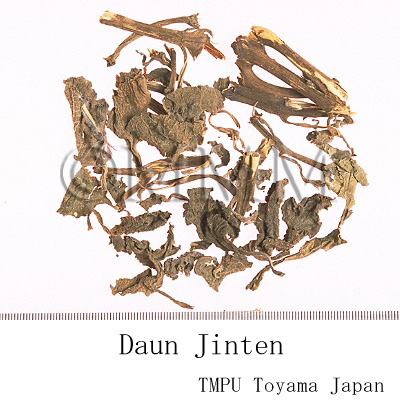Crude drug sample data base
※Click on the image to enlarge it.
Scientific information data base
| Crude drug name | Indonesian name, English name | Daun jinten | |||
|---|---|---|---|---|---|
| crude drug image |
| ||||
| Original plant name | Coleus amboinicus Lour. syn. Plectranthus amboinicus (Lour.) Spreng. | ||||
| Family name | Labiatae | ||||
| Used part | Leaves | ||||
| Distribution area | Cultivated in Java, 1-1100 m altitude in home gardens, also grows wild [201]. | ||||
| Description | Leaves thick, fleshy and fragile, heart-shaped , 4-9 cm long, margin toothed and rounded. The plant is an erect herb, spreading plant with many branches. Flowers small, pale violet to white. Odour: strongly aromatic [222]. | ||||
| Drug effect | Hot, neutralizing, blood cleanser [231]. | ||||
| Specific actions | Expectorant, antiseptic, carminative [231]. | ||||
| Frequency in use | Moderate. | ||||
| Common uses | Crushed leaves are used to moisturize hair and perfume clothes (while washing clothes). Leaves are mixed and cooked with goat meat [201]. | ||||
| Pharmacological effect | Lactating women receiving Coleus amboinicus supplementation had a 65% increase in milk volume during the last two weeks of supplementation. The study confirmed the belief and the practice that the plant can be used as a lactagogue in human and might be suitable for lactating women in general [PMID: 16672214]. Urine and histopathological results revealed the antilithiotic activity of Plectranthus amboinicus, particularly of calcium oxalate origin. | ||||
| Medical system | Indonesian medicine (Jamu) | ||||
| Traditional usage | Treatment of wounds. Pounded leaves are rubbed all over the body and drink the juice to treat fever. It is also used to treat chapped lips, mouth ulcer, cough and headache. Crushed leaves are applied on the temples to cure headache. Leaves are chewed to treat thrush. Steepings of leaves in water is used to cure cough. Seeds: smallpox, anti emetic, leprosy, epilepsy, syphilis, whooping cough, leucoderma, and influenza. As breast milk stimulant [201, 222], [PMID: 16289602]. | ||||
| Formulation | 1) Fever: Crushed leaves are squeezed to obtain juice. Drink the juice and rubbed the residue on the skin. Juice of a mixture with Kalanchoe pinnata leaves is spent out overnight and exposed to early morning dew, and should be administered by the patient. At the same time, a little amount of the juice is diluted with water and use for bathing. A mixture of the juice with sesame oil is a good remedy for asthma and cough. Especially for cough, the juice is mixed with sugar to make a syrup [201]. 2) Ulcer: Crushed leaves are put inside the mouth for treating ulcers. For the same purpose, leaves can also be chewed [201]. 3) Cough: 7 pieces of leaves are boiled with 100 ml of water to make a decoction. Drink 100 ml of the decoction twice a day, in the morning and in the evening for 14 days [231]. 4) Headache: 2 pieces of fresh leaves of C. amboinicus, 2 pieces of fresh leaves of Vitex trifolia, 1 rhizome of Zingiber officinale, rhizome of Zingiber cassumunar and water. Pound all ingredients to make a paste, apply the paste on the temples and behind the ears [231]. Bruised leaves are put externally for headache [201]. | ||||
| References | Reference book Tips! | [201] K. Heyne, Tumbuhan Berguna Indonesia, Vols. 1-4, 1987. Diedarkan Oleh Koperasi Karyawan Departemen Kehutanan, Jakarta, Indonesia. Vol. 3, pp 1698-1699. [222] P.T. Eisai Indonesia: Medical Herb Index in Indonesia (Second edition).1995. p 259. [231] Soedibyo, Mooryati: Alam Sumber Kesehatan: Manfaat dan Kegunaan (Natural resources for health. Benefits and uses). Balai Pustaka. 1998. pp 127-128. | |||
| Research paper | 1. Damanik R, Wahlqvist ML, Wattanapenpaiboon N. Lactagogue effects of Torbangun, a Bataknese traditional cuisine. Asia Pac J Clin Nutr. 15(2):267-74, 2006. (PMID: 16672214) 2. Lukhoba CW, Simmonds MS, Paton AJ. Plectranthus: a review of ethnobotanical uses. J Ethnopharmacol. 3;103(1):1-24, 2006. (PMID: 16289602) | ||||
| Last renewal date | 2024/03/01 | ||||




